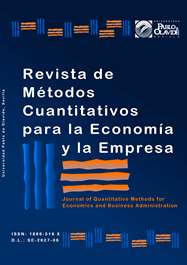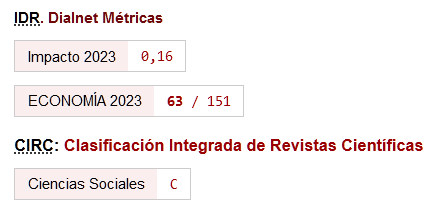The Prize for Implementing Accounting Reforms in the Public Sector Promoted by Multilateral Organizations
DOI:
https://doi.org/10.46661/revmetodoscuanteconempresa.2422Keywords:
NICSP, nueva gestión pública, administración pública, contabilidad pública, deuda externa, IPSAS, new public management, public management, public sector accounting, external debtAbstract
Nowadays, there are many countries implementing the International Public Sector Accounting Standards (IPSAS) under the assumption that they allow to provide quality to accounting information, as well as greater transparency and accountability. This research, in turn, seeks to establish that this process is articulated according to a logic in which the State is another market agent, so actors such as lenders and some multilateral organizations (e.g., the World Bank) encourage the IPSAS implementation by granting financial benefits for debtor countries. After constructing an unbalanced data panel that includes about 67 low-income countries and covers the period 2005-2012, estimating various econometric models and performing rigorous statistical tests, it is found, for example, that there is a negative relationship between the average interest rate on the new external debt and the Quality of Budgetary and Financial Management (proxy for the advance in IPSAS implementation).
Downloads
References
Banco Mundial. (2014). Program appraisal document on a proposed credit to the Republic of Rwanda. Washington: Banco Mundial.
Banco Mundial. (2016). CPIA database. Recuperado el 5 de diciembre de 2016, de http://data.worldbank.org/indicator/IQ.CPA.FINQ.XQ
Beck, N. & Katz, J. N. (1995). What to do (and not to do) with time-series cross-section data. American Political Science Review, 89(3), 634-647.
Beechy, H. (2007). Does full accrual accounting enhance accountability? The Innovation Journal: the Public Sector Innovation Journal, 12(3), 1-18.
Brusca, I. & Montesinos, V. (2013). From rethoric to practice: The case of Spanish local government reforms. Financial Accountability & Management, 29(4), 354-377.
Brusca, I.; Gómez-Villegas, M. & Montesinos, V. (2016). Public financial management reforms: The role of IPSAS in Latin-America. Public Administration and Development, 36, 51-64.
Castañeda-Rodríguez, V. (2012). Una revisión de los determinantes de la estructura y el recaudo tributario: El caso latinoamericano tras la crisis de la deuda externa. Cuadernos de Economía, 31(58), 77-112.
Castañeda-Rodríguez, V. (2013). La tributación en América Latina desde la crisis de la deuda y el papel del legislativo en Colombia. Revista de Economía Institucional, 15(28), 257-280.
Chan, J. (2008). International Public Sector Accounting Standards: Conceptual and institutional issues. En M. D´Amore (ed.): The harmonization of government accounting and the role of IPSAS (págs. 19-33). Milan: McGraw-Hill.
Christiaens, J.; Reyniers, B. & Rollé, C. (2010). Impact of IPSAS on reforming governmental financial information systems: A comparative study. International Review of Administrative Sciences, 76(3), 537-554.
Christiaens, J.; Vanhee, C.; Manes-Rossi, F.; Aversano, N. & van Cauwenberge, P. (2015). The effect of IPSAS on reforming governmental financial reporting: An international comparison. International Review of Administrative Sciences, 81(1), 158-177.
Dell'Erba, S. & Sola, S. (2016). Does fiscal policy affect interest rates? Evidence from a factor-augmented panel. The B.E. Journal of Macroeconomics, 16(2), 395-437.
Diamond, J. (2002). Performance budgeting: Is accrual accounting required? IMF Working Paper 02/240. Washington: IMF.
Humphrey, C.; Miller, P. & Scapens, R. (1993). Accountability and accountable management in the UK public sector. Accounting, Auditing and Accountability Journal, 6(3), 7-29.
IFAC (2014). The importance of accrual-based financial reporting in the Public Sector. New York: IFAC.
IFAC (2015). Manual de Pronunciamientos Internacionales de Contabilidad del Sector Público. Nueva York: IPSASB.
FMI (2001). Manual de Estadísticas de Finanzas Públicas 2001. Washington: FMI. Recuperado de https://www.imf.org/external/pubs/ft/gfs/manual/esl/pdf/all.pdf.
Kurunmäki, L. (2009). Management accounting, economic reasoning and the new public management reforms. En C. Chapman, A. Hopwood & M. Shields (eds.): Handbook of management accounting research, Volume 3 (págs. 1371–1383). Oxford: Elsevier.
Navarro, A. & Rodríguez, M. (2011). Utilidad del modelo de valoración de las IPSAS para la rendición de cuentas de los gobiernos: la perspectiva de los OCEX. Revista Española de Financiación y Contabilidad, 40(149), 125-162.
Ofoegbu, G. (2014). New public management and accrual accounting basis for transparency and accountability in the nigerian public sector. Journal of Business and Management, 16(7), 104-113.
Pina, V. & Torres, L. (2003). Reshaping public sector accounting: an international comparative view. Canadian Journal of Administrative Sciences, 20(4), 334-350.
Premchand, A. (1999). Public financial management: Getting the basics right. En S. Schiavo-Campo (ed.): Governance, corruption and public financial management (págs. 47-88). Manila: Asian Development Bank.
PwC (2013). Towards a new era in government accounting and reporting. Price Waterhouse Coopers. Recuperado de https://www.pwc.com/gx/en/psrc/publications/assets/pwc-global--ipsas-survey-government-accounting-and-reporting-pdf.pdf
Rutherford, B. (1990). Towards a conceptual framework for public sector financial reporting. Public Money and Management, 10(2), 11-15.
Sour, L. (2017). Avances en la cantidad de la información financiera del sector público en México a raíz de la LGCG. Contaduría y Administración, 62(2), 419-441.
Sutcliffe, P. (2015). Financial reporting under the cash basis of accounting (the Cash Basis IPSAS) – Limited scope review. New York: IFAC. Recuperado de https://www.ifac.org/system/files/meetings/files/agenda_item_3_combined-v1.pdf
Trewavas, K.; Botica-Redmayne, N. & Fawzi, L. (2012). The impact of IFRS adoption on public sector financial statements. Australian Accounting Review, 22(60), 86-102.
Veneziano, A. (2005). Reflexiones sobre una reforma orientada al ciudadano: la descentralización participativa de Montevideo. Madrid: Instituto Nacional de Administración Pública.
Downloads
Additional Files
Published
How to Cite
Issue
Section
License
Copyright (c) 2018 Journal of Quantitative Methods for Economics and Business Administration

This work is licensed under a Creative Commons Attribution-ShareAlike 4.0 International License.
Submission of manuscripts implies that the work described has not been published before (except in the form of an abstract or as part of thesis), that it is not under consideration for publication elsewhere and that, in case of acceptance, the authors agree to automatic transfer of the copyright to the Journal for its publication and dissemination. Authors retain the authors' right to use and share the article according to a personal or instutional use or scholarly sharing purposes; in addition, they retain patent, trademark and other intellectual property rights (including research data).
All the articles are published in the Journal under the Creative Commons license CC-BY-SA (Attribution-ShareAlike). It is allowed a commercial use of the work (always including the author attribution) and other derivative works, which must be released under the same license as the original work.
Up to Volume 21, this Journal has been licensing the articles under the Creative Commons license CC-BY-SA 3.0 ES. Starting from Volume 22, the Creative Commons license CC-BY-SA 4.0 is used.










